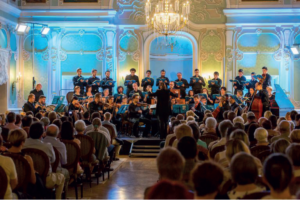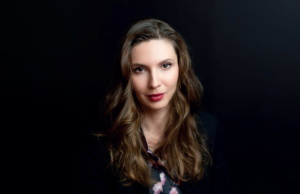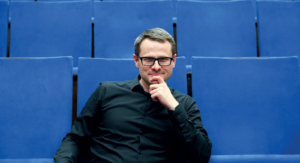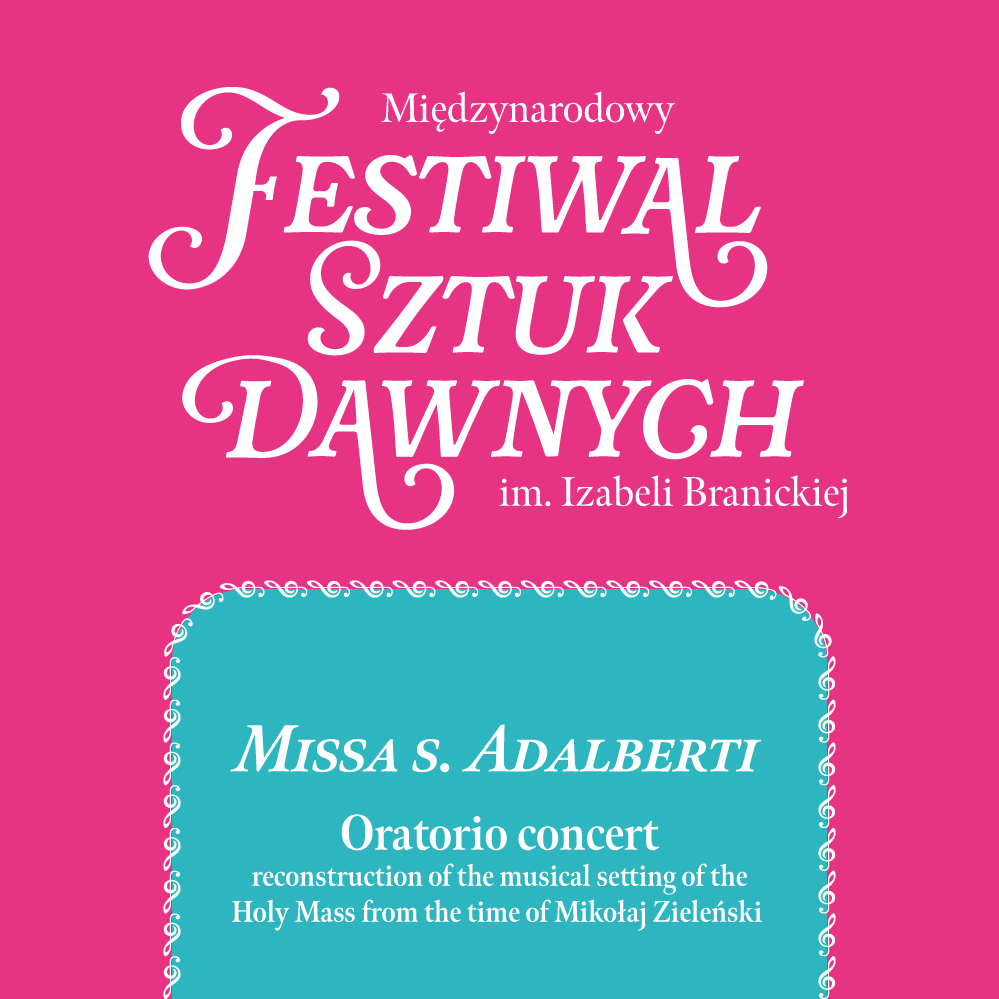Watch on-line:
Performers:
- DILETTO - Early Music Ensemble
SOPRANOS: Marta Wróblewska*, Antonina Ruda
ALTS: Piotr Olech*, Jan Mędrala
TENORS: Piotr Szewczyk*, Szczepan Kosior
BASS: Piotr Zawistowski*, Maciej Falkiewicz
CLARINI: Paweł Hulisz (I), Paweł Kowalkowski (II)
TROMBONES: Fryderyk Mizerski (alt), Paweł Wachowski (tenor), Paulino Taica Frias (tenor), Clemens Erdmann (bas)
DULCIAN: Beniamin Levi
VIOLIN: Paweł Polak (I), Anna Polak (II)
VIOLA: Radosław Koper
CELLO: Katarzyna Martynkiewicz
DOUBLE BASS: Rafał Makarski
POSITIVE: Sylwester Trojanowski
Anna Moniuszko – CONDUCTOR
*the artist performs solo parts (choir concertans) in Missa Concertata La Lombardesca by B. Pękiel - Schola Gregoriana Sancti Casimiri
Mariusz Perkowski – kantor, bariton, music director
TENORS: Krzysztof Frejtag, Maciej Dziemiańczuk
BARITONS: Marcin Szaciłowski, Łukasz Olechno
BASS / DRUM: Wojciech Bronakowski
ORGAN: Karol Jurgielewicz
Event description:
The concert will feature both instrumental and vocal-instrumental compositions from the Venetian school, whose formal principles, particularly the use of polychoral techniques, inspired composers across Europe and laid the foundation for the development of concertato music.
The remarkably captivating polychoral technique, based on the interplay between vocal, vocal-instrumental, and instrumental ensembles, emerged from the unique architecture of St. Mark’s Basilica in Venice. The layout of the church, and its acoustics, allowed for the placement of ensembles in different parts of the building, while maintaining the necessary auditory connection for the cohesive performance of a given piece. The individual „choirs” would engage in a form of musical dialogue, competing and then uniting in shared song.
This innovative compositional approach spread throughout Europe, including Poland. One of the composers working in this style was Mikołaj Zieleński, whose works form the core of this concert PROGRAMME. His compositions gained renown both in Poland and abroad (his Offertoria et communiones totius anni was published in 1611 by the Venetian press of Jacopo Vincenti). Even today, his works are performed and recorded by leading early music ensembles worldwide, such as The Sixteen and Les Baroque Traversée.
PROGRAMME:
• Claudio Monteverdi
Toccata z „L’Orfeo”
• Mikołaj Zieleński
Per merita sancti Adalberti, motet ku czci św. Wojciecha Biskupa i Męczennika
• Marcin Mielczewski
Aria a 3
• Introit: Protexisti me Deus – Georgian chant**
• Marcin Mielczewski
Kyrie – Missa Triumphalis
• Marcin Mielczewski
Gloria – Missa Triumphalis
• Graduale: Alleluja, Surrexit Pastor – Georgian chant*
• Alleluja, Posuisti Domine – Georgian chant*
• Mikołaj Zieleński
II Fantazja a 3
• Bartłomiej Pękiel
Credo: Missa Concertata La Lombardesca
• Offertorium: Posuisti Domine – Georgian chant
• Mikołaj Zieleński
Posuisti Domine
• Mikołaj Zieleński
III Fantazja a 3
• Bartłomiej Pękiel
Sanctus: Missa Concertata La Lombardesca
• Giovanni Battista Grillo
Sonata seconda à 7
• Bartłomiej Pękiel
Agnus Dei: Missa Concertata La Lombardesca
• Communio: Ego sum pastor bonus – Georgian chant*
• Mikołaj Zieleński
Ego sum Pastor Bonus
• Mikołaj Zieleński
Laetabitur iustus
• Ite missa est – Georgian chant*
• Mikołaj Zieleński
Ortus de Polonia, motet in honor of St. Stanislaus, Bishop and Martyr
*Fragmenty chorałowe z Chorału Piotrkowczyka z 1614 r.
DILETTO - Early Music Ensemble
 The ensemble was founded in 2005 to express interests and explorations in early music performance. Its members include both vocalists and instrumentalists. Artistic direction is provided by founder and conductor Anna Moniuszko. The ensemble’s repertoire includes instrumental and vocal-instrumental pieces from the Baroque era, including great oratorios: Messiah and Israel in Egypt by G. F. Händel, Oratorio on the Ascension: Lobet Gott in seinen Reichen by J. S. Bach, as well as the passions: J. S. Bach – Passion according to St. John and Brockes Passion by G. F. Händel and odes: H. Purcell Hail’s Bright Cecilia! and G. F. Handel’s Eternal Source of Light Divine.
The ensemble was founded in 2005 to express interests and explorations in early music performance. Its members include both vocalists and instrumentalists. Artistic direction is provided by founder and conductor Anna Moniuszko. The ensemble’s repertoire includes instrumental and vocal-instrumental pieces from the Baroque era, including great oratorios: Messiah and Israel in Egypt by G. F. Händel, Oratorio on the Ascension: Lobet Gott in seinen Reichen by J. S. Bach, as well as the passions: J. S. Bach – Passion according to St. John and Brockes Passion by G. F. Händel and odes: H. Purcell Hail’s Bright Cecilia! and G. F. Handel’s Eternal Source of Light Divine.
DILETTO’s artistic achievements also include stage performances of H. Purcell’s operas Dido and Eneas and The Fairy Queen, G.B. Pergolesi‘s La Serva Padron, J. Blow’s Venus and Adonis, by N. Piccinni (Polish premiere of La buona figliuola and Il Cavaliere per amore) and A. Sacchini (Polish premiere of the opera La Contadina in corte). The idea that guides the artists in the group is to present early music in accordance with the requirements of historical performance style. In its activities, DILETTO pays great attention to promoting the works of old Polish composers, including newly discovered ones, whose works are still unknown to the wider public.
In this trend, the DILETTO ensemble recorded two albums titled: Andrzej Siewiński – opera omnia and Old Masters – newly discovered, which were published in a series by the “Polska Muzyka Dawna” (Polish Early Music) publishing house of the DUX record label. The group regularly participates in festivals, including: East of Culture – Another Dimension, Old Arts Festival – Izabela Branicka’s Name Day, Salesian Summer in Przemyśl and Forum Musicum in Wrocław.
Schola Gregoriana Sancti Casimiri
 Schola Gregoriana Sancti Casimiri was founded in 2008. It is composed of singers passionate about performing traditional church music, particularly Gregorian chant. The artistic direction of the group is led by Mariusz Perkowski. The Schola made its debut at the Sacred Song Festival „Łapskie Te Deum” in 2008. Since then, it has participated in numerous concerts, aiming to musically reconstruct church services from the 17th and 18th centuries through monodic singing. It collaborates regularly with the Diletto Early Music Ensemble in these endeavors and has also worked with the Polish 18th Century Orchestra under the baton of Paul Esswood.
Schola Gregoriana Sancti Casimiri was founded in 2008. It is composed of singers passionate about performing traditional church music, particularly Gregorian chant. The artistic direction of the group is led by Mariusz Perkowski. The Schola made its debut at the Sacred Song Festival „Łapskie Te Deum” in 2008. Since then, it has participated in numerous concerts, aiming to musically reconstruct church services from the 17th and 18th centuries through monodic singing. It collaborates regularly with the Diletto Early Music Ensemble in these endeavors and has also worked with the Polish 18th Century Orchestra under the baton of Paul Esswood.
The Schola regularly participates in festivals, performing at events such as the Historical Reenactment Festival „Battle of Białystok,” the Festival of Ancient Arts – the Name Day of Izabela Branicka (annually), the 8th International Festival of Organ and Chamber Music in honor of Fr. Wacław Rabczyński, and the 3rd edition of the Moniecki International Musical Evenings at St. Albert’s. In many instances, their concerts have inaugurated festivals, as was the case with the Mysterium Fidei Festival (2013), the 6th edition of the Organ and Chamber Music Concerts in Ełk, the „Fide et Amore” Religious Art Festival in Żory, and the Mikołaj z Koźla Festival in Kędzierzyn-Koźle in 2016 and 2021.
The ensemble has contributed to several phonographic recordings, including Opera Omnia by Andrzej Siewiński for the DUX label, accompanying the Diletto Early Music Ensemble. Additionally, they released Religious Hymns by Franciszek Karpiński and European Christmas Carols, featuring medieval works related to the Christmas season, through the „Pro Anima” Foundation. The Schola regularly sings during Masses celebrated in the extraordinary form of the Roman Rite, as part of the „Latin Tradition Ministry of the Archdiocese of Białystok,” established in 2013 by Archbishop Edward Ozorowski. During these Masses, the group performs both the Ordinary and Proper Gregorian chants for the weekly celebrations.
Anna Moniuszko – Conductor
 She graduated from the Fryderyk Chopin University of Music (specialising in conducting vocal and vocal-instrumental ensembles) and postgraduate choir master’s studies at the Feliks Nowowiejski Academy of Music in Bydgoszcz (2004), receiving diplomas with distinction. In 2010, she obtained a doctoral degree, in 2014 – a habilitated doctor in the speciality of conducting, and, in 2023, the title of professor of art. In 2003, she started her professional career at the Białystok Branch of AMFC (currently the Fryderyk Chopin University of Music). In the same year, she took up the position of Second Conductor, and from 2017, she became the Conductor of the Choir of the Medical University of Białystok, with which she won many awards at competitions in Poland and abroad and was honoured many times with special awards for the Best Conductor of the Competition. In 2005, she founded the DILETTO Early Music Ensemble, specialising in performing Renaissance and Baroque pieces. The ensemble’s repertoire includes instrumental and vocal-instrumental pieces from the Baroque era, including great oratorios: Messiah and Israel in Egypt by GF Händel, Ascension Oratorio, Christmas Oratorio, Easter Oratorio by J. S. Bach, Christmas Oratorio by H. Schütz as well as passions: Passion according to St. John by J. S. Bach and Brockes Passion by G. F. Händel and odes by H. Purcell – Hail Bright Cecilia! and G. F. Handel’s Eternal Source of Light Divine. DILETTO’s artistic achievements also include stage performances of opera works by H. Purcell (Dido and Eneas and The Fairy Queen), GB Pergolesi (La Serva Padrona), J. Blow (Venus and Adonis), N. Piccinni (Polish premiere of the operas La buona figliuola and Il Cavaliere per amore), as well as A. Sacchini (Polish premiere of the opera La Contadina in corte).
She graduated from the Fryderyk Chopin University of Music (specialising in conducting vocal and vocal-instrumental ensembles) and postgraduate choir master’s studies at the Feliks Nowowiejski Academy of Music in Bydgoszcz (2004), receiving diplomas with distinction. In 2010, she obtained a doctoral degree, in 2014 – a habilitated doctor in the speciality of conducting, and, in 2023, the title of professor of art. In 2003, she started her professional career at the Białystok Branch of AMFC (currently the Fryderyk Chopin University of Music). In the same year, she took up the position of Second Conductor, and from 2017, she became the Conductor of the Choir of the Medical University of Białystok, with which she won many awards at competitions in Poland and abroad and was honoured many times with special awards for the Best Conductor of the Competition. In 2005, she founded the DILETTO Early Music Ensemble, specialising in performing Renaissance and Baroque pieces. The ensemble’s repertoire includes instrumental and vocal-instrumental pieces from the Baroque era, including great oratorios: Messiah and Israel in Egypt by GF Händel, Ascension Oratorio, Christmas Oratorio, Easter Oratorio by J. S. Bach, Christmas Oratorio by H. Schütz as well as passions: Passion according to St. John by J. S. Bach and Brockes Passion by G. F. Händel and odes by H. Purcell – Hail Bright Cecilia! and G. F. Handel’s Eternal Source of Light Divine. DILETTO’s artistic achievements also include stage performances of opera works by H. Purcell (Dido and Eneas and The Fairy Queen), GB Pergolesi (La Serva Padrona), J. Blow (Venus and Adonis), N. Piccinni (Polish premiere of the operas La buona figliuola and Il Cavaliere per amore), as well as A. Sacchini (Polish premiere of the opera La Contadina in corte).
In her activities, Anna Moniuszko pays great attention to promoting the works of old Polish composers, including newly discovered ones, whose works are still unknown to the wider public. In this trend, together with the DILETTO ensemble, she has recorded two albums: Andrzej Siewiński – opera omnia and Old Masters – newly discovered, which were published in the publishing series “Polska Muzyka Dawna” (Polish Early Music) of the prestigious DUX record label.
Anna Moniuszko is the winner of the Scholarship for Young Creators (2009) and the Scholarship for Professional Creators (2010) funded by the Mayor of Białystok. She is the originator and coordinator of the Białystok series of Baroque Masters Music concerts, presenting the works of old composers in the historic interiors of Białystok. She is also the Artistic Director of the International Izabela Branicka Festival of Early Arts, the idea of which is to present to contemporary audiences the culture and art from the glory days of the Branicki court in Białystok. Since 2016, she has been the Director of the International Choral Competition “Cantu Gaudeamus” in Białystok.
Mariusz Perkowski
 A graduate in Music Education from the Fryderyk Chopin University of Music, Białystok branch, and the Postgraduate Choral Conducting Program in Bydgoszcz. He also completed theological studies at the Pontifical Faculty of Theology in Warsaw, as well as doctoral studies at the Institute of Musicology at the John Paul II Catholic University of Lublin, specializing in Liturgical Monody. He has taught voice emission at the Archdiocesan Major Seminary in Białystok and delivered lectures on Gregorian chant and liturgics as part of the Church Music specialization at the Chopin University of Music’s Białystok branch.
A graduate in Music Education from the Fryderyk Chopin University of Music, Białystok branch, and the Postgraduate Choral Conducting Program in Bydgoszcz. He also completed theological studies at the Pontifical Faculty of Theology in Warsaw, as well as doctoral studies at the Institute of Musicology at the John Paul II Catholic University of Lublin, specializing in Liturgical Monody. He has taught voice emission at the Archdiocesan Major Seminary in Białystok and delivered lectures on Gregorian chant and liturgics as part of the Church Music specialization at the Chopin University of Music’s Białystok branch.
As a vocalist, he has collaborated with numerous ensembles specializing in historically informed performances of early music, including the Sine Nomine chamber choir and the Concerto Polacco baroque orchestra under the direction of Marek Toporowski, the Subtilior Vocal Ensemble led by Piotr Zawistowski, the Ars Nova Early Instruments Ensemble directed by Jacek Urbaniak, and currently with the Diletto Early Music Ensemble under the direction of Anna Moniuszko. Since 2008, he has also led the Men’s Vocal Ensemble Schola Gregoriana Sancti Casimiri.
He is actively engaged in cultural promotion, organizing concerts and festivals in the historically informed performance (HIP) movement. In 2016, he was honored with a special distinction for his lifetime achievements with the „Kulturalne Gryfy” Award from the Białystok City Council in the category of Cultural Animator.

